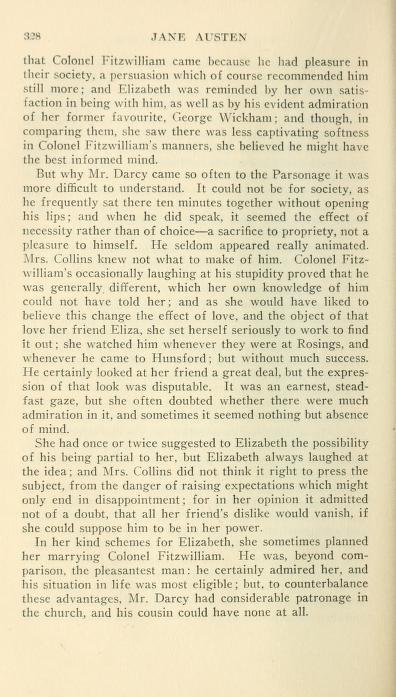 ............prev...................v?....................next
............prev...................v?....................next {{prhprp328.jpg}}
that Colonel Fitzwilliam came because he had pleasure in
their society, a persuasion which of course recommended him
still more; and Elizabeth was reminded by her own satis-
faction in being with him, as well as by his evident admiration
of her former favourite, George Wickham; and though, in
comparing them, she saw there was less captivating softness
in Colonel Fitzwilliam's manners, she believed he might have
the best informed mind.
But why Mr. Darcy came so often to the Parsonage it was
more difficult to understand. It could not be for society, as
he frequently sat there ten minutes together without opening
his lips; and when he did speak, it seemed the effect of
necessity rather than of choice -- a sacrifice to propriety, not a
pleasure to himself. He seldom appeared really animated.
Mrs. Collins knew not what to make of him. Colonel Fitz-
william's occasionally laughing at his stupidity proved that he
was generally different, which her own knowledge of him
could not have told her; and as she would have liked to
believe this change the effect of love, and the object of that
love her friend Eliza, she set herself seriously to work to find
it out; she watched him whenever they were at Rosings, and
whenever he came to Hunsford; but without much success.
He certainly looked at her friend a great deal, but the expres-
sion of that look was disputable. It was an earnest, stead-
fast gaze, but she often doubted whether there were much
admiration in it, and sometimes it seemed nothing but absence
of mind.
She had once or twice suggested to Elizabeth the possibility
of his being partial to her, but Elizabeth always laughed at
the idea; and Mrs. Collins did not think it right to press the
subject, from the danger of raising expectations which might
only end in disappointment; for in her opinion it admitted
not of a doubt, that all her friend's dislike would vanish, if
she could suppose him to be in her power.
In her kind schemes for Elizabeth, she sometimes planned
her marrying Colonel Fitzwilliam. He was, beyond com-
parison, the pleasantest man: he certainly admired her, and
his situation in life was most eligible; but, to counterbalance
these advantages, Mr. Darcy had considerable patronage in
the church, and his cousin could have none at all.
[328]............prev.....................next................